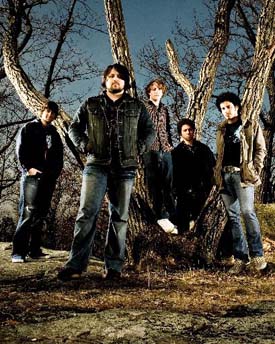
Casey Crescenzo has always had a thing for orchestration. His past two releases under The Dear Hunter moniker have always had a strong string and horn presence which gave a nice unpredictability to the tracks. Instead of, say, strings coming in to highlight an emotional moment in a song, they would simply take the lead.
Entire songs were built less and less around the basic guitar/drum/bass convention, and more and more around a structure that was far from basic indie-rock.
Act III: Life and Death is the third installment in a proposed six-part story following a character only known as The Dear Hunter, and you can probably guess much of the subject matter from that alone.
The lyrics themselves are no surprise from Crescenzo. The man has a way of putting some complex statements into lyrical form (“Where families’ sons are robbed beneath their feet, and hearts conceit/ ‘Ab Ovo,’ the angel sings, ‘Ad astra’ our eyes to the sea,” from the song “What It Means To Be Alone”), but falls prey at times to some distracting, overly literal lyrics bereft of any sort of craft or polish.
At one point during the song “He Said He Had a Story,” the listener has no choice but to do a dramatic double take as he hears “She had disrobed, and she was waiting on the floor/ She asked me what it was I want, I thought that I wanted it all.”
Regardless, Crescenzo has always pulled together his touch-and-go lyrics with his voice, which is nothing if not technically fantastic. When he belts out a note, he has a tendency to completely overtake the music in the best way possible. When his voice strains itself to a scream, the emotion is palpable.
But the most unfortunate thing about his voice on Act III is that he often seems perfectly happy to sing normally. It sounds fine, of course, but he refuses to let his voice take control of the song. We’re left to rely on the music behind Crescenzo, and that’s where the album starts to fall apart.
Crescenzo not only likes to spice up his compositions with strings and the like, he apparently carries a lifetime membership to the school of Add More Instruments to Your Songs, which he uses and abuses often. On past releases, this manifested itself more organically. On Act III, the songs become overstuffed with ideas and instruments.
There are probably great songs underneath all the muck, but there’s just too much to pick through to get to them.
On top of that, Crescenzo has some new desire to make every note of every song soaring and epic and heart-pounding. So, the drums on most tracks are saturated with reverb – giving them the annoying feeling of being recorded in a warehouse made of testosterone – and the tempos of many songs have been ratcheted up for maximum impact.
There’s almost nothing recalling past standouts such as Act I’s “His Hands Matched His Tongue” or Act II’s “Smiling Swine.” The former rides a quiet intro to a well-deserved climax built on Crescenzo’s belting vocals, and the latter follows a curious, show-tune style to become one of the more memorable The Dear Hunter tracks.
On Act III, the second half picks up for the crushing monotony of the first, but not enough to nullify it entirely. “Saved” is one of the first songs to stubbornly refuse to erupt in an intense volley of strings and horns and guitars and voice and everything, sticking to a rather pretty guitar and piano melody. “Father” harkens back to past successes from the band’s catalog, probably because it’s pretty much “His Hands Matched His Tongue” part two.
But even on the half of the album not wholly bogged down in excess, some ideas just fall short. “Go Get Your Gun,” the foot stompin’, banjo strummin’, “let’s make a really catchy song” song is ultimately more cheesy than fun, and “Mustard Gas” isn’t much more than another attempt by Crescenzo and company to rip your head clean off your body.
The worst part about all this? The band is talented, and phenomenally so. It has the capability to produce such effective and emotionally fertile songs without biting off more than it can chew. Crescenzo has showed his adeptness for all this in the past.
Where is it, then, on Act III?
jwolper@umd.edu
RATING: 2 out of 5 stars



